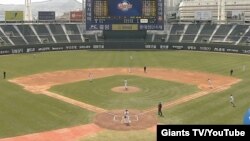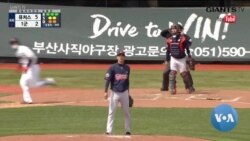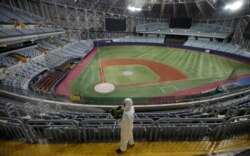It’s a sunny weekday afternoon in early spring, and the Lotte Giants of the Korean Baseball Organization are playing one of the very few professional sporting events on earth - with no fans around to watch.
With virtually all global sports curtailed because of the coronavirus pandemic, the Giants are staying sharp by playing practice games against themselves in front of 27,000 empty green and yellow seats at their ballpark in Busan, South Korea.
Inside the cavernous stadium, every sound of the game is amplified - every shattered bat, every groan after a batter swings and misses, the constant chatter between players and coaches in the dugout.
It’s heaven for baseball purists and other socially distanced, sports-starved fans in Korea and around the world, who have tuned in by the tens of thousands to watch live streams of the games on the Giants' YouTube page.
“I think (the world) desperately needs baseball,” says Kerry Maher, a Giants superfan-turned-employee who was taking in the action from a seat behind home plate.
Even though the games don't count, about 10 times as many fans have been watching some of the Giants' intra-squad games on YouTube, compared to the team’s average regular season home games last year.
“People want sports right now, people are thirsty for it,” says Kim Sung Min, who works in the Giants front office. “I like to think that we’re just helping them out, just giving them a bit of a fix.”
South Korea is one of the few places in the world where this could happen now. The country saw a quick spike in coronavirus infections late last month but was able to quickly reduce its spread with a campaign of vigorous testing, isolation, and social distancing.
Several Korean baseball teams, as well as some professional football (soccer) clubs here, have since begun broadcasting their exhibition games online. Professional baseball leagues in Taiwan and Japan have also announced they will hold games - without fans - in mid to late April.
“We’ve been able to run daily practices for them, and for the sake of security, scrimmages have been the only sensible way to go,” says Kim. “Because scrimmages by nature, you’re just playing with each other inside the team without any outside contact.”
To a large extent, baseball already incorporates social distancing rules. Most fielders stand a dozen meters or more from each other. And there is no sustained physical contact.
Many of the Giants players wear disposable face masks - an unusual sight for a baseball field even in East Asia, where mask-wearing is relatively common.
“Washing my hands as often as I can and wearing my mask and staying clean -- that’s the most important thing for me now,” says Adrian Sampson, an American player who arrived in South Korea last month. “We just are trying to keep everyone safe and set a good example for everybody.”
The game feels different in many other obvious ways. There are no raucous in-game songs or chants that are a hallmark of Korean baseball games, no walk-up music for each batter, and no loud advertisements between innings.
No gimmicks. Just baseball. At a time when sports fans need it most.
“It’s all we got. There’s no baseball, no soccer, no basketball, no car racing,” says Maher, a retired American university professor with a long white beard and an ever-present Giants baseball cap.
Maher has become something in between a team mascot and a local celebrity, after attending virtually every Giants game for several years. Recently, the team hired him to help foreign players adjust to life in Korea.
Maher says he now hopes the healing power of baseball can soon help things return to some semblance of normalcy.
It's not far-fetched. Baseball has been a Godsend after past tragedies, such as the September 11, 2001 terrorist attacks. Even in normal times, the arrival of baseball in the spring is a sign of happier days to come, wiping away the coldness of winter.
“We need some distraction,” says Maher. “And something spring-like."







